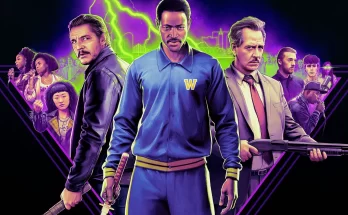Want to hear more from the actors and creators of your favorite shows and films? Subscribe to The Cinema Spot on YouTube for all of our upcoming interviews!
Lead Critic for the site, as well as serving as an editor when needed.
It is often hard to do science fiction in film really well. Two filmmakers are killing it in the genre right now: Christopher Nolan and Denis Villeneuve. Dune (titled Dune: Part One onscreen) came as quite a surprise in 2021, and while I was unsure what to make of the initial trailers, I saw the film months after its release. Having now watched the film four times, Dune has to be one of the best films of the century.
Furthermore, Dune: Part Two is quite possibly the best film ever. Many would say the sheer scale alone of Dune: Part Two makes it so, but the argument could quite possibly be made due to Villeneuve and Jon Spaihts’ superb screenplay. The source material is elevated in the best ways; the biggest changes from the novel include the use of characters and subplots that make sense due to Part One‘s events. Ultimately, these changes were inevitable and expected.
Villeneuve has seemingly handled Frank Herbert’s novel with the utmost care, and even the most hardcore of Dune fans should be pleased. Dune: Part Two begins similarly to Part One, slow and steady, although, through the dialogue, there is near-constant chaos. Part Two could arguably be the director’s magnum opus. It is just such an awe-inspiring, epic film; there is so much that needs to be wrapped up, and by the end, nothing feels left to discuss. In one word, Denis Villeneuve’s Dune: Part Two is triumphant.
Spoilers to follow.
The Tragedy of the Antihero
By now, everyone knows Frank Herbert wrote his follow-up Dune Messiah to explain why Paul Atreides (pronounced Atre-a-des) was not the hero of the first book. Ultimately, the author suggests that Dune is a warning about following charismatic, often religious or revenge-fueled leaders, etc. Paul’s arc can also be compared to other similar fictitious characters that audiences tend to love: Anakin Skywalker, Michael Corleone, or even John Wick.
Now, Villeneuve and Spaihts make the writing nearly crystal clear that Paul is really almost the antagonist of the film in many ways. This is also not to say that he has those heroic moments that drive the film, and even the audiences want to see this play out. Timothée Chalamet and Zendaya have fantastic chemistry as Paul and Chani, the latter of whom is the heart of the film. This is perhaps the biggest departure from the source material: in the books, Chani is much more loyal to Paul and doesn’t really question many of his actions. However, in the film, she is one of the few who doesn’t buy into the prophecy of the Lisan al-Gaib.
This is also where the central conflict of the film derives from: Paul can’t really love Chani the way she wants if Paul follows this prophecy. It turns into a Holy War across the entire known universe. In the beginning, Paul doesn’t seem to want to follow this path. He just wants revenge for what House Harkonnen did to his House. The Fremen just seem to be a way for him to achieve that goal, ultimately, leading him to betray every ideal he stood for in the first place and becomes the Lisan al-Gaib. That seems a bit depressing, doesn’t it?
The screenplay alone makes the film so powerful. Villeneuve has crafted an exceptional piece of filmmaking. Dune: Part Two feels like the culmination of every major piece of science fiction filmmaking, and this is a science fiction film that seems to outdo every one before it. Chalamet feels born for this role, absolutely commanding the scene and demanding the audience’s attention.
Influences & Boundary Pushing
Dune: Part Two is nothing short of huge. Every aspect of the film feels like something epic and almost astounding that it is so damn good. There are many juxtapositions between Parts One and Two, down to Hans Zimmer’s score. There are also small juxtapositions between the beginning and ending of Part Two as well, namely the acute awareness of Paul and the disasters that have been caused by the Bene Gesserit planting the ideal of the Lisan al-Gaib.
Lady Jessica (Rebecca Ferguson)
Paul is influenced by so many other people throughout the film, and especially on Arrakis, there is so much more going on than just Paul’s fight. Rebecca Ferguson’s Lady Jessica is perhaps the biggest influence on the character. Early on in the film, she drinks the Water of Life, a substance excreted from a drowned young sandworm that is fatal to males. Upon drinking this elixir, she becomes the Reverend Mother of Sietch Tabr, and gains the influence, memories, and pain of everyone before her. This process also awakens her unborn child’s mind, Paul’s sister, Alia, played ever so subtly by Anya Taylor-Joy.
Ultimately, the moments proceeding Jessica’s turn into the Reverend Mother achieve the Bene Gesserit’s goal of making her truly believe in the Kwisatz Haderach, thus in a way that forces Paul down the dark path. The Kwisatz Haderach is just the Bene Gesserit’s name for the Messiah. The big difference is that the Bene Gesserit developed this prophecy over ninety generations and have been eagerly awaiting the perfect male figure, resulting in Paul. In Part One Jessica was extremely skeptical about the true nature of the prophecy.
Shaddam IV (Christopher Walken) and Alia Atreides (Anya Taylor-Joy)
Paul has several monologues throughout Part Two, mostly towards the film’s climax and end. Chalamet’s sheer presence in the scene feels like a monologue given by Leonardo DiCaprio or Al Pacino. There is a key scene at the end of the film between Paul and Emperor Shaddam IV (Christopher Walken) and it almost felt like Walken was taken aback at how good Chalamet is as Paul.
Alia’s characterization is another departure from the novel. Instead of being born towards the end, she merely communicates with Jessica. She is seen once by Paul in a vision. Again, all of the changes in the film don’t feel out of place. Some of these elements can be compared to Peter Jackson’s Lord of the Rings trilogy, for example.
Stilgar (Javier Bardem) and Gurney Halleck (Josh Brolin)
Belief and faith are often powerful things too. Stilgar (Javier Bardem) believes in the prophecy to his core. Sometimes his movements and dialogue are comedic, but this feels intentional, returning to the powerful belief in an ideal, like the Lisan al-Gaib. Once Paul rides the biggest sandworm ever, Stilgar is convinced of his supposed greatness, and will do everything he can to convince the Fremen who don’t believe. Ultimately, Stilgar’s actions are key to making Paul believe this is his true path. However, a point should be made that this path is one of several futures Paul sees in his visions. Moreover, due to the sheer influence of everything, he seems to see this as the only way.
Gurney Halleck (Josh Brolin) is perhaps my favorite character to return from the first film. Halleck shows Paul where the family atomic warheads are, and much like Paul, just wants revenge for House Atreides. The character seems to be one of the few influences on Paul that keeps his head semi-level. He also serves Paul’s every move, and like Duncan Idaho from Part One, has no problem laying down his life for his Duke.
From Hero to Antihero
There are arguably so many scenes where Paul’s transformation can be seen once he takes in the Water of Life. However, two particular scenes felt more powerful than the others. The first is the moment he kills his maternal grandfather, Baron Vladimir Harkonnen (Stellan Skarsgård). If it wasn’t for the Water of Life, it would come off as a great revenge moment. However, without even blinking, Paul simply walks right up to him and stabs him in the neck, almost enjoying watching him slowly die. Paul tells him that he “dies like an animal.” The line wasn’t entirely needed, but it really drove home the transformation of Paul and almost made him the villain in that moment alone.
On the other hand, there is na-Baron Feyd-Rautha Harkonnen, played exceptionally by Austin Butler. Feyd could be seen as the film’s “true” antagonist and villain and is arguably much more psychotic on the surface than Paul is by the film’s conclusion. Butler brings out one of the best villain performances in recent years and is almost undeniably one of the best parts of the film. It’s on par with those like Heath Ledger’s Joker and Anthony Hopkins’s Hannibal Lecter.
Another moment that is a testament to the true impact of the film’s story on its characters is one of its final moments. Once the dust has settled and Paul begins his ascension, the Great Houses don’t buy into this whole thing. Naturally, they need to be dealt with, and Paul tells Gurney Halleck and Stilgar to “lead them to Paradise.” Thus, this starts the prophesied Holy War on the entire known universe. Once Paul gives this command, everything changes forever. There is a look shared between Princess Irulan (Florence Pugh) and Chani, a look of despair and disappointment. They both now truly realize what they’ve become a part of. In a way, this moment is haunting.
Technical Aspects
Dune: Part Two features some of the best technical pieces of filmmaking I have ever seen in any science fiction film or just any film of this sheer volume and depth ever. Greig Fraser displays the best cinematography of his career thus far, and each frame is something of sheer beauty and simplicity. Joe Walker edited the film together in the best way, simply never missing a beat. His editing is so slick and clean that one tends to not even really notice the cuts to and from.
Hans Zimmer boasts his most impressive score yet, albeit tending to somehow be better with each film he conducts. Zimmer’s score features snippets of the music from the first film. However, he takes these pieces and makes almost the opposite of what should be a “happy” hymn. Patrice Vermette’s production design is something to behold. The Giedi Prime set is something otherworldly and the black and white of everything is just so intoxicating to look at. Likewise, Jacqueline West’s costumes are amazing, and characters like Princess Irulan and Lady Margot Fenring (Léa Seydoux) are brought to life in the best way possible here.
Final Thoughts on Denis Villeneuve’s Dune: Part 2
With Legendary Pictures releasing Dune: Part Two in March, it feels like the bar is set awfully high for the rest of the year’s releases. Still, it just feels great that a film such as this exists, and it’s the reason theatres exist in the first place. Witnessing Dune: Part Two on the big screen feels like an event. With so many undertones of just the story of Dune, audiences almost need to see this in theatres at least once, as the universe of Dune operates on spice to travel.
Denis Villeneuve absolutely blows away expectations for this film and one almost leaves the theatre feeling that you’ve seen all you can see. Like… how does life continue from this point? Furthermore, Dune: Part Two is one of the best films of all time, and maybe even the greatest science fiction film ever. Likewise, it can be called one of the greatest sequels of all time. Dune: Part Two is just tremendously brilliant.
5/5 stars.
Denis Villeneuve’s Dune: Part Two is now playing in theatres worldwide!
If you aren’t already, be sure to follow us on on Facebook, X/ Twitter, and Instagram!
Also, if you are looking to read up on the source material, then we highly recommend purchasing physical copies of Dune and Dune Messiah, both written by Frank Herbert, via our Amazon Affiliates links!
Lead Critic for the site, as well as serving as an editor when needed.



